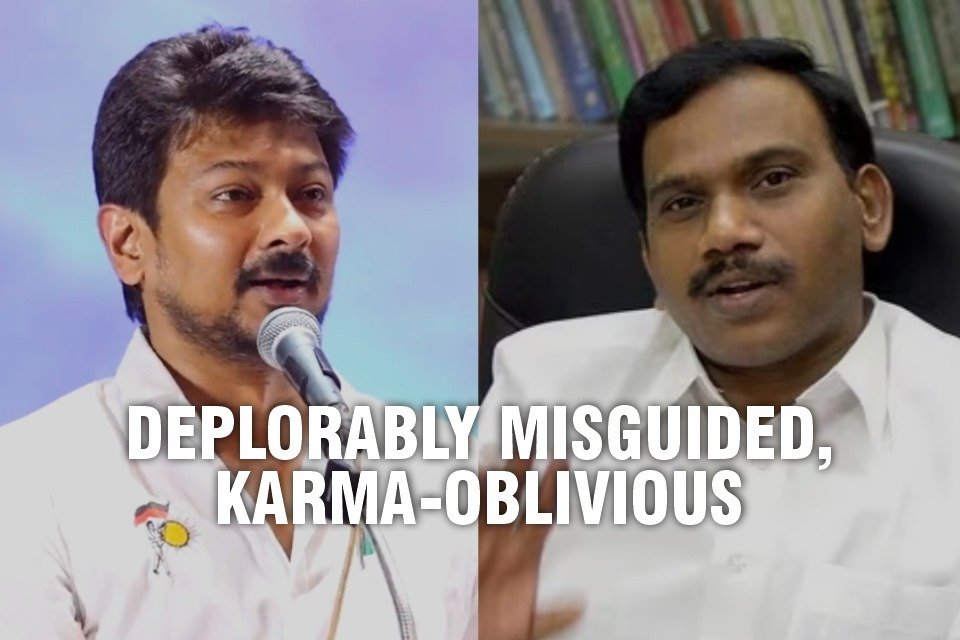In the tumultuous world of Indian politics, it is not uncommon for politicians to engage in heated debates and discussions. Yet, there are lines that should never be crossed, lines that separate responsible discourse from reckless incitement. Unfortunately, DMK’s MP Andimuthu Raja has not only crossed these lines but has done so with a reprehensible and thoughtless comparison.
In the wake of the ongoing controversy surrounding Tamil Nadu minister Udhyanaidhi Stalin’s remarks about ‘Sanatana Dharma,’ Raja’s comments have only exacerbated the situation. Comparing this sacred belief system to social stigma and deadly diseases like HIV and leprosy is not just misguided; it is downright offensive.
Raja’s words reveal a profound lack of understanding of the cultural and spiritual significance of ‘Sanatana Dharma.’ It is an ancient belief system that has withstood the test of time, offering solace, wisdom, and moral guidance to millions. To equate it with social stigma and diseases is not only ignorant but also deeply hurtful to those who hold these beliefs dear.
Furthermore, Raja’s comments demonstrate a disturbing trend in Indian politics, where sensationalism and inflammatory rhetoric are used to score political points. Responsible leaders should be promoting tolerance, understanding, and unity among diverse communities, not sowing the seeds of division and discord.
The comparison to HIV and leprosy is particularly insensitive. Both of these diseases have inflicted immeasurable suffering on countless individuals and families. To use them as metaphors in a political debate is not only disrespectful but also trivialises the very real pain and hardship experienced by those affected by these conditions.
Raja’s remarks not only tarnish the image of his party but also undermine the principles of responsible and respectful political discourse. It is a sad reflection of the state of politics when elected representatives resort to such callous and offensive language.
Andimuthu Raja’s comments regarding ‘Sanatana Dharma’ are not just ill-conceived; they are a disgrace to the ideals of responsible politics. Such inflammatory rhetoric only deepens divisions in society, and fosters an atmosphere of intolerance. It is high time that we hold our elected representatives accountable for their words and actions.
SANATANA DHARMA’S UNWAVERING EMBRACE
Sanatana Dharma stands out as a shining example of tolerance, acceptance, and unwavering grace. The ancient Indian philosophy is a way of life that has weathered the test of time, embracing even those who abuse, denigrate, or attack it.
At the heart of Sanatana Dharma lies a profound understanding of human nature, and the recognition that diversity is an inherent part of existence. One of the most notable facets of Sanatana Dharma is its belief in the interconnectedness of all living beings. This interconnectedness, or “Vasudhaiva Kutumbakam,” is a core principle that encourages Hindus to see the divine spark in every individual, regardless of their beliefs or actions. This profound perspective fosters a culture of acceptance, where even those who criticise or attack Sanatana Dharma are seen as fellow beings on a journey of self-discovery.
In the modern age of social media and instant communication, it’s all too common to witness heated debates, hate speech, and religious intolerance. However, Sanatana Dharma, with its deep philosophical roots, offers a different approach.
The timeless teachings of Sanatana Dharma emphasise self-realisation, spiritual growth, and the pursuit of truth. These values invite individuals to focus on their own actions and inner transformation, and a steadfast commitment to one’s own spiritual path.




